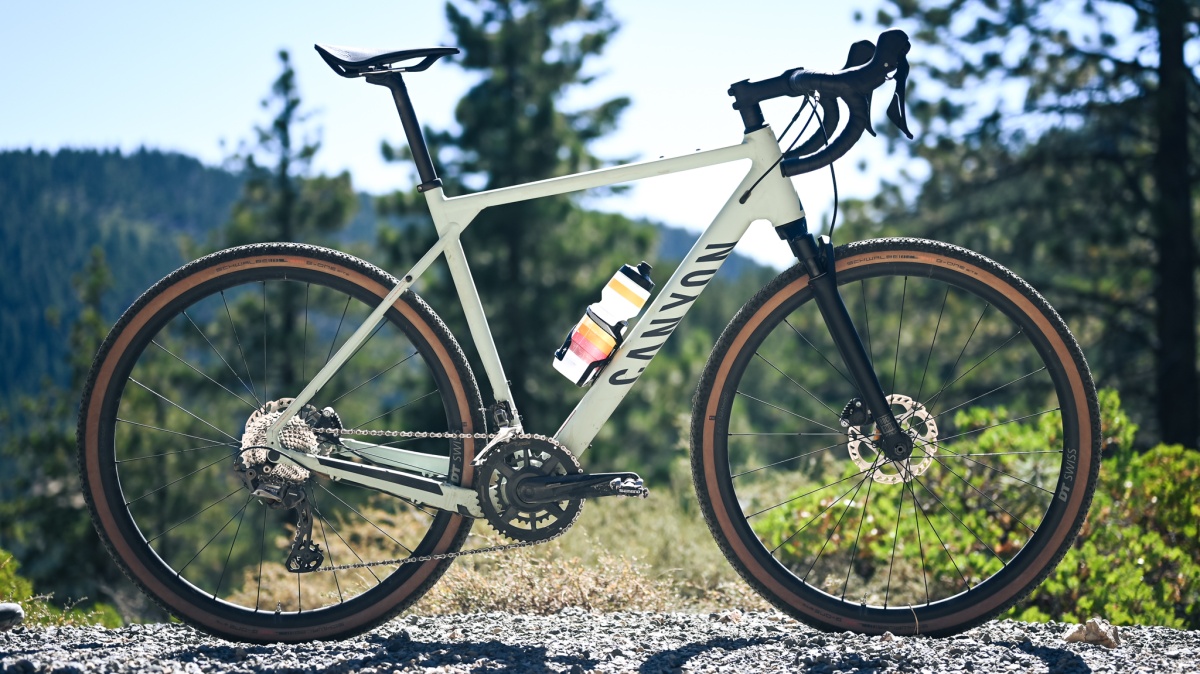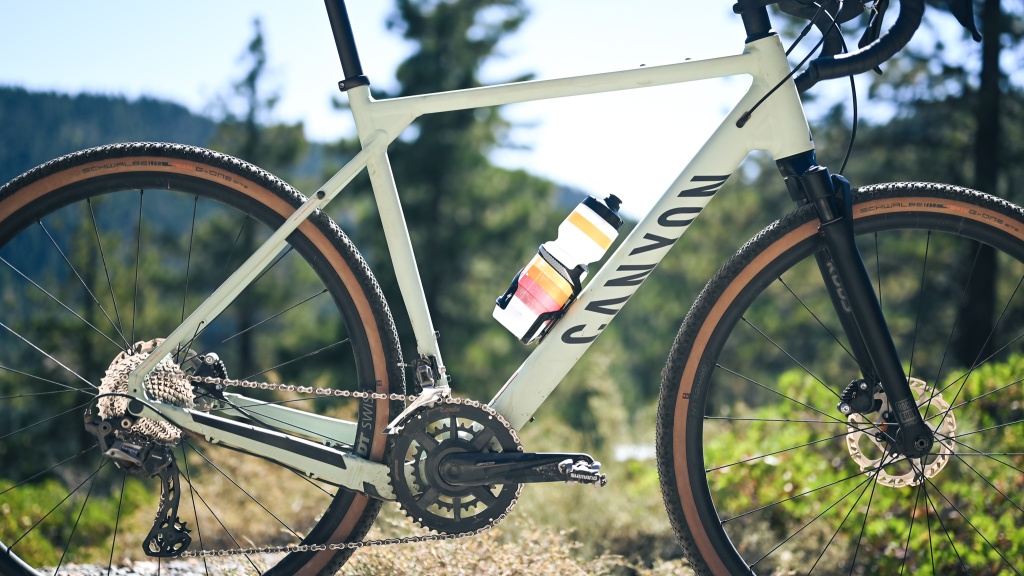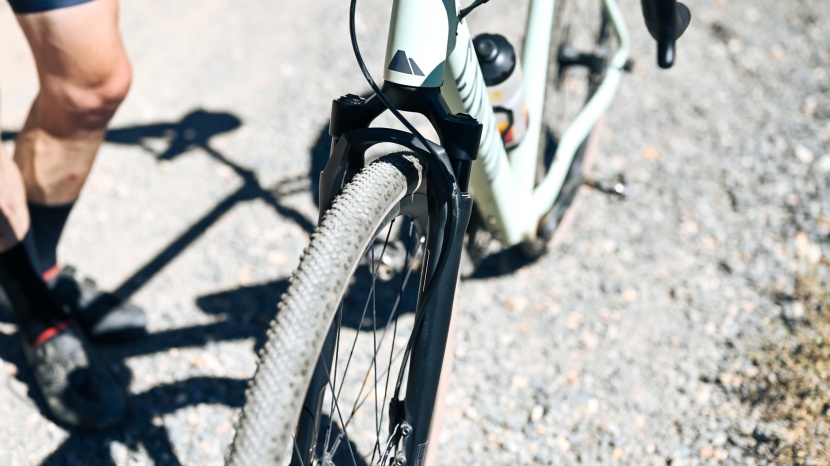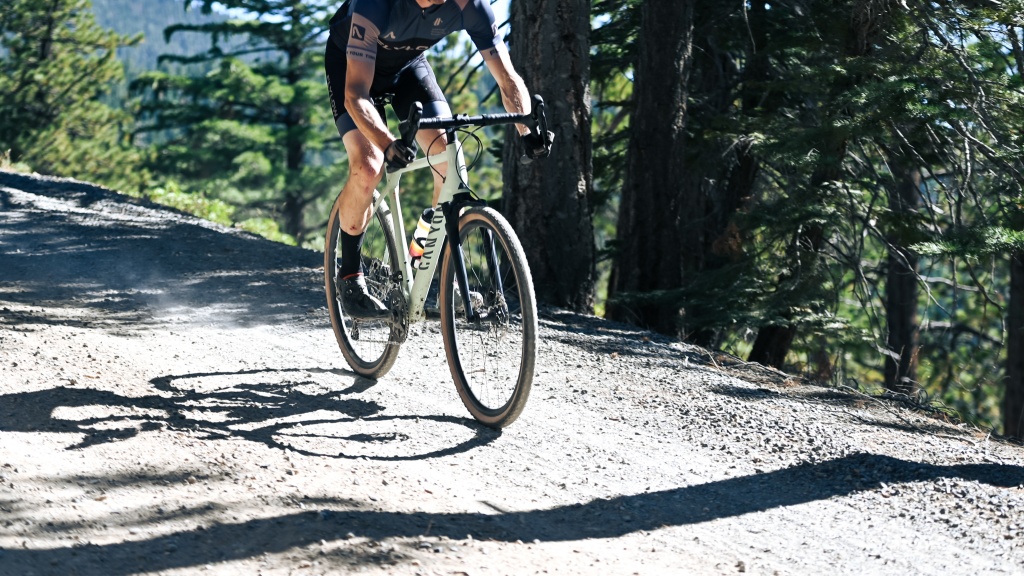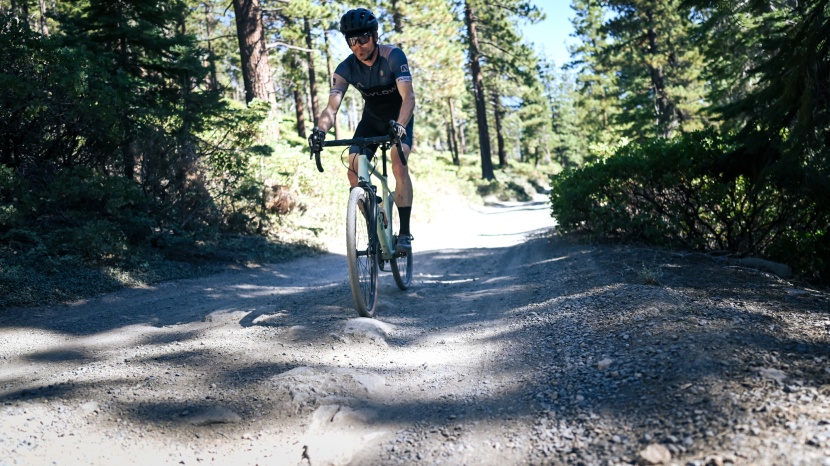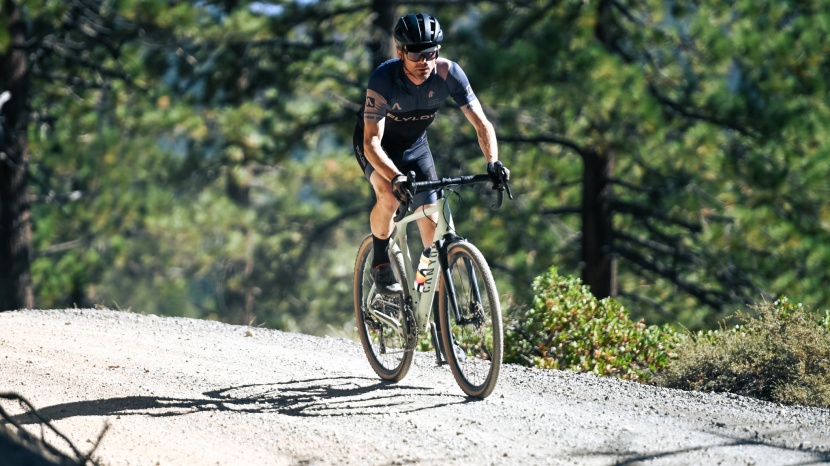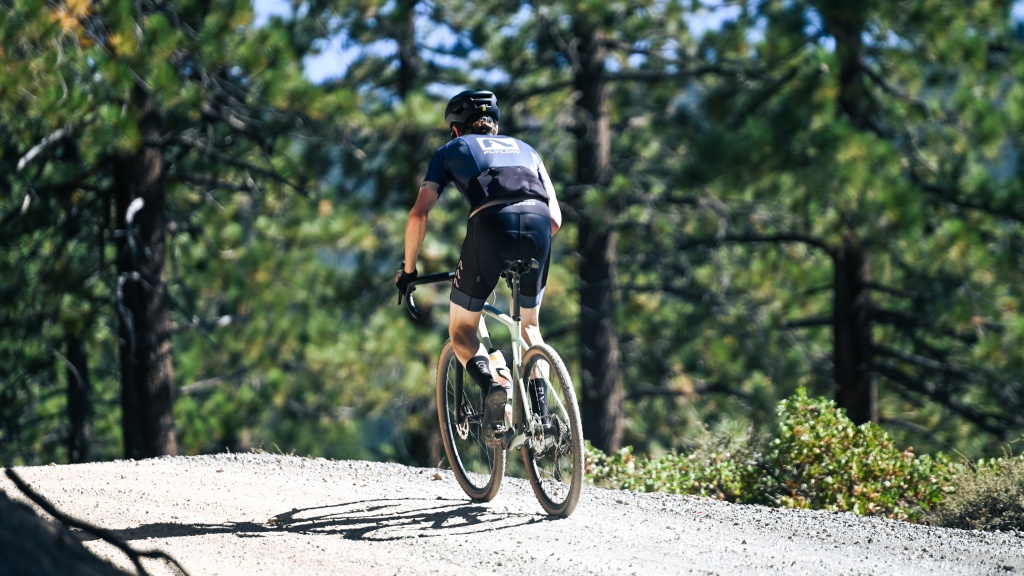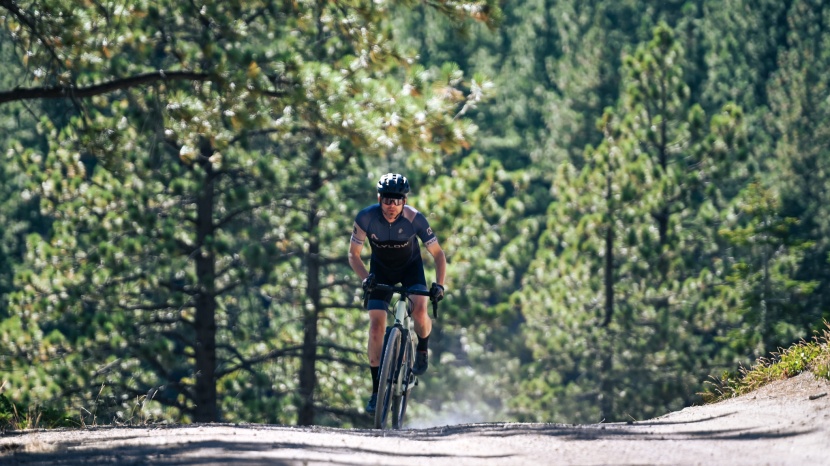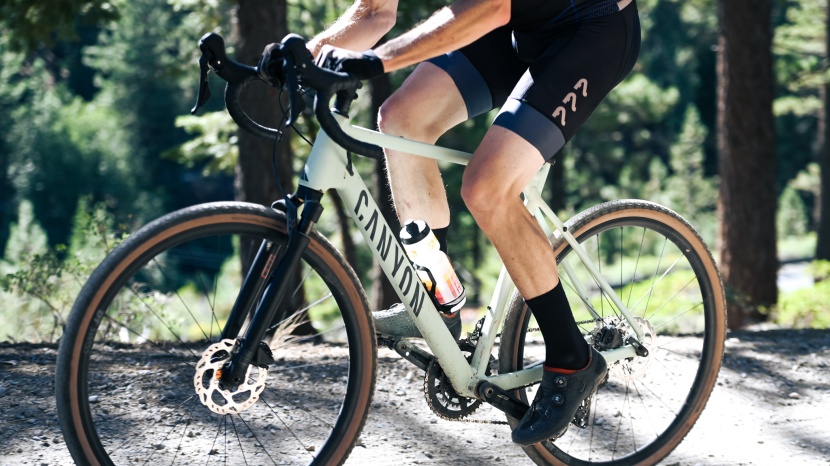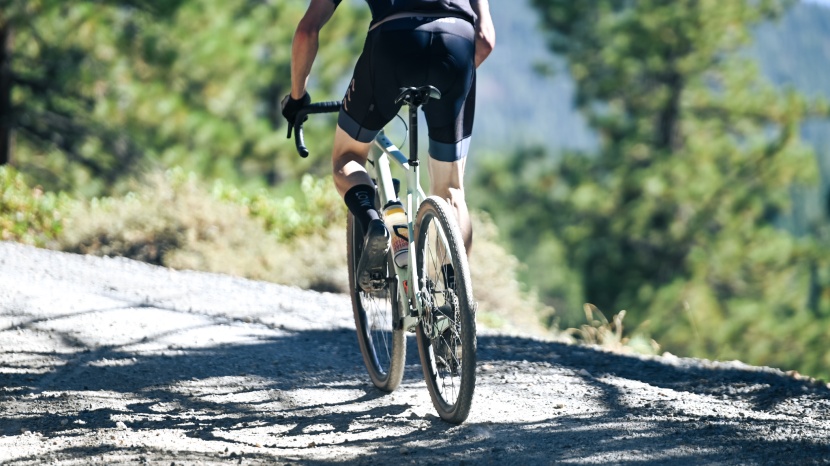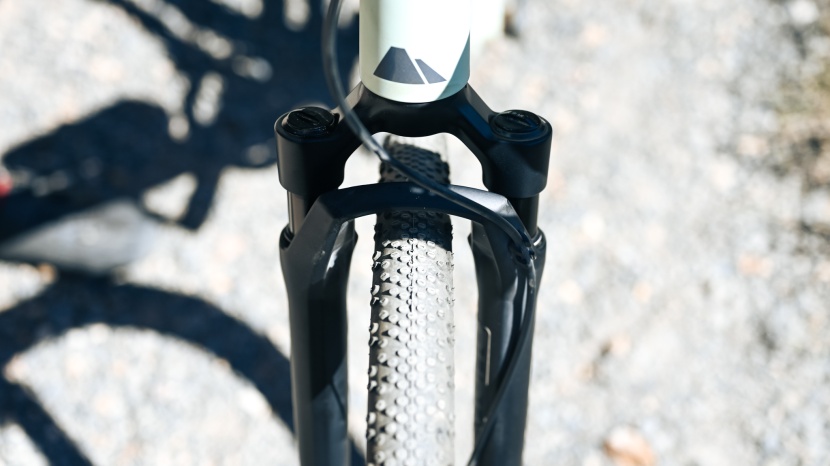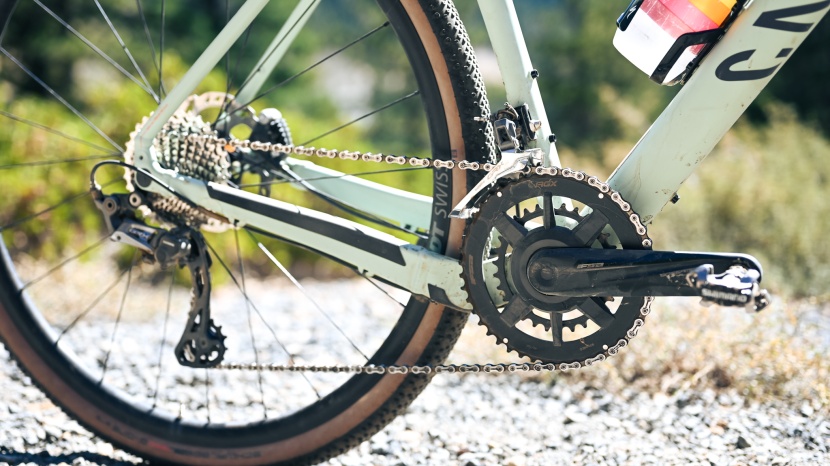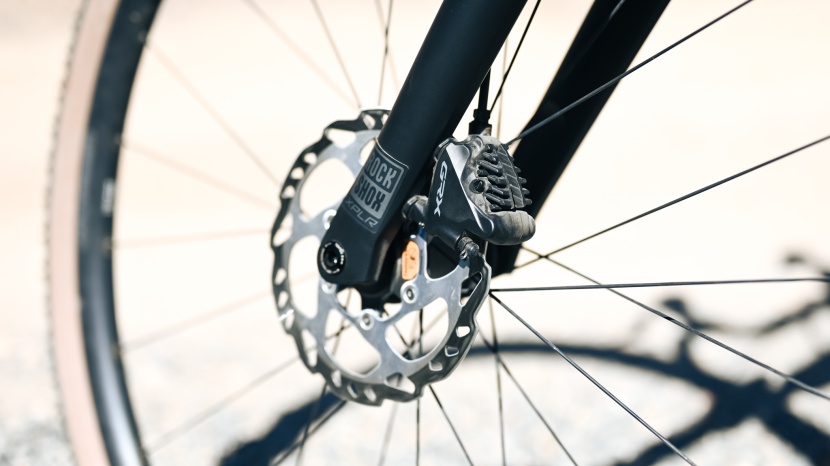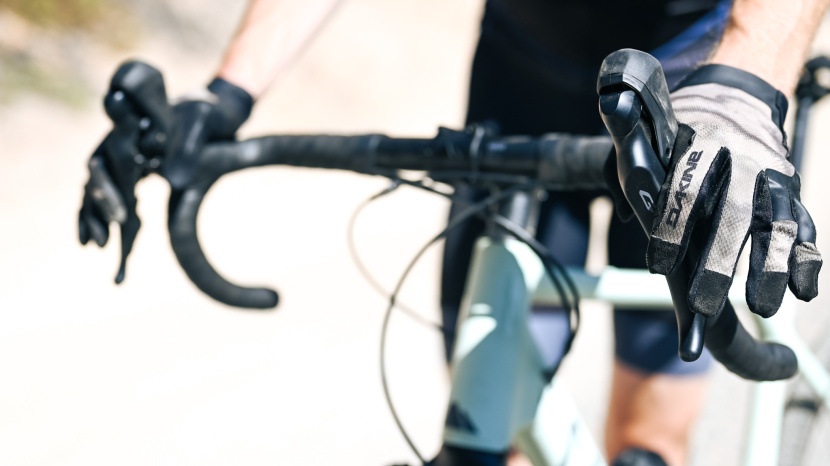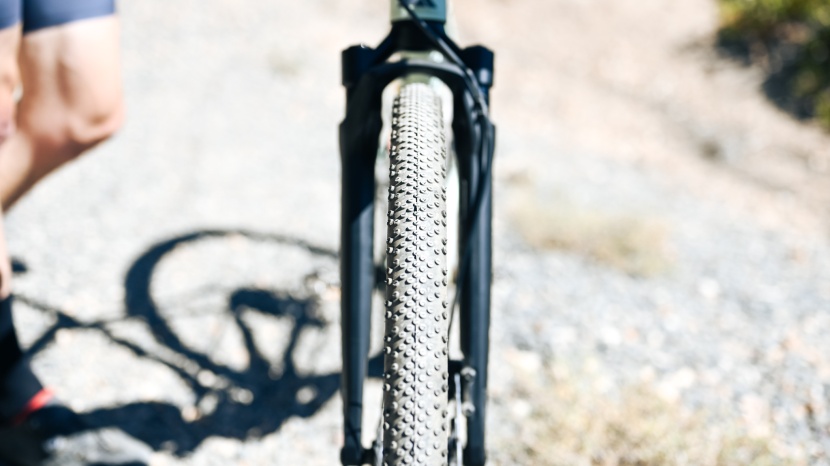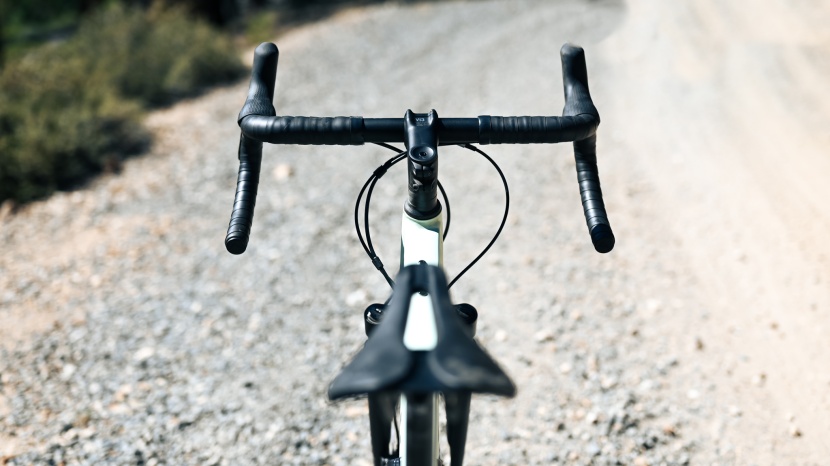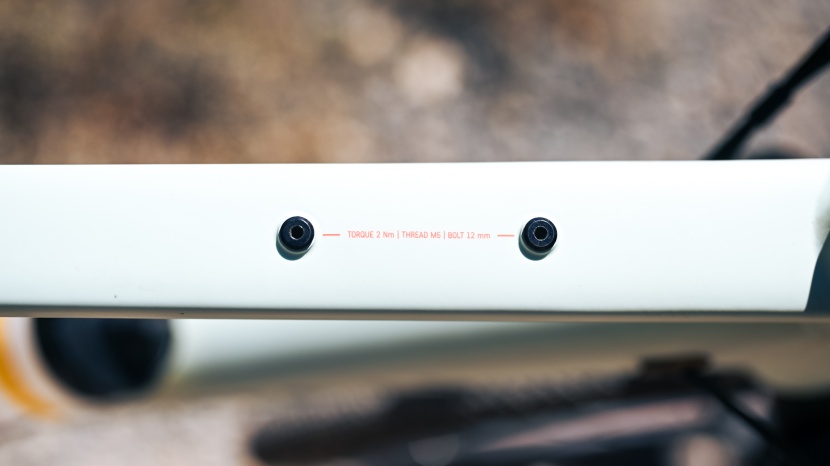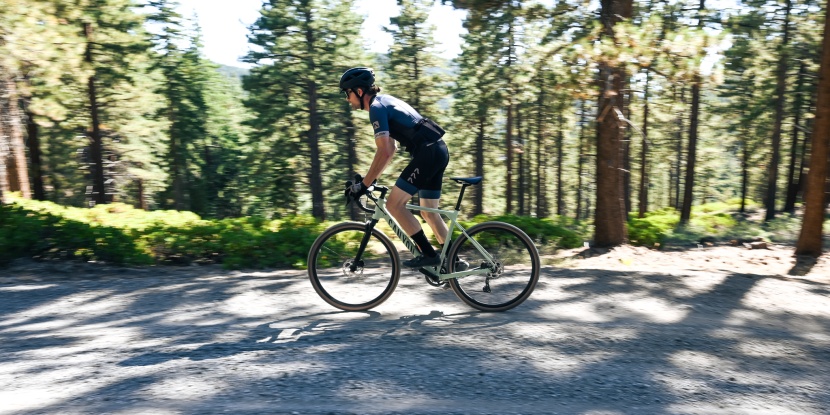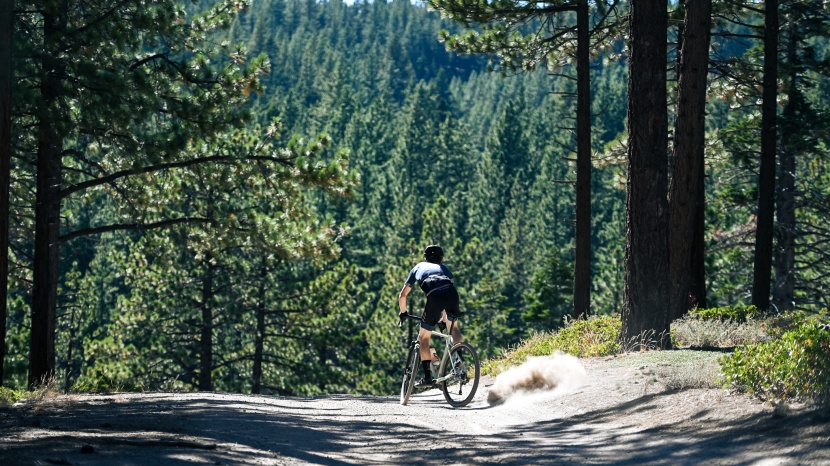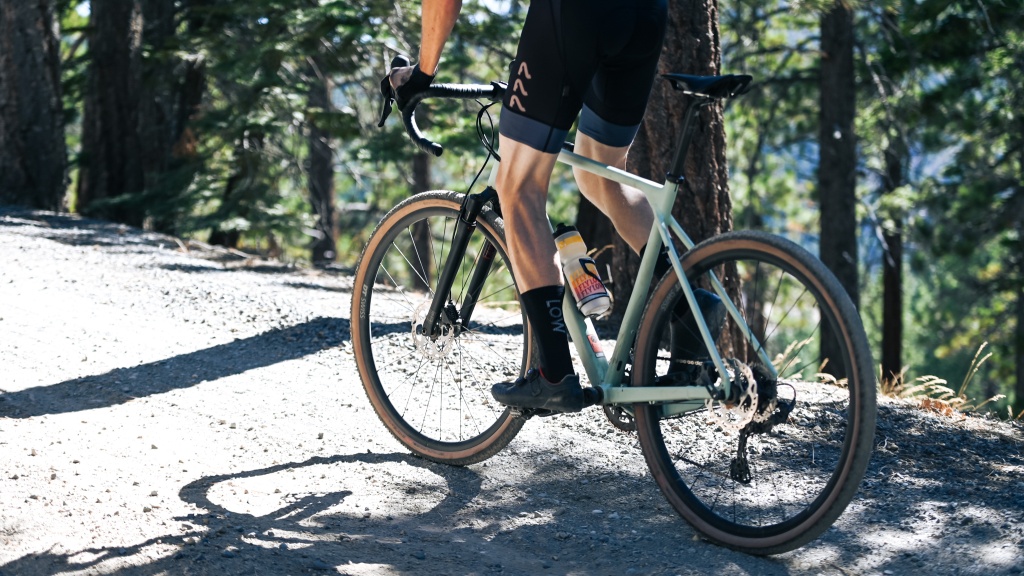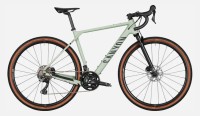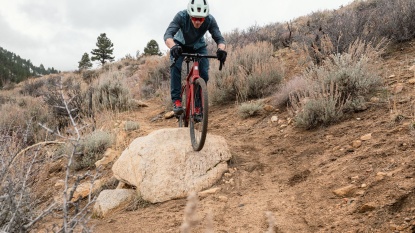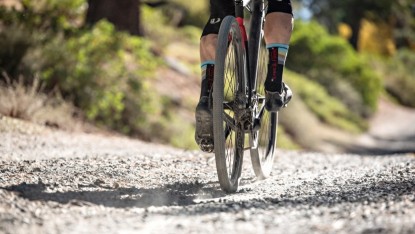Canyon Grizl 7 Suspension Review

Our Verdict
Our Analysis and Test Results
Frame Design
The Grizl 7 Suspension has a full aluminum frame that has been purpose-built for gravel and adventure riding. In addition to the aluminum models, Canyon also makes the Grizl in carbon fiber, denoted by the letters CF SL or CF SLX in the name. Regardless, all Grizl frames feature internal cable routing (including for dropper seatposts), several mounts for water bottles and accessories on the frame (rigid forks have accessory mounts as well), rubber chainstay protection, and clearance for tires up to 50mm wide. It seems clear that Canyon intended the Grizl to be a do-anything gravel bike, ready to take on your first gravel race or head out on a month-long bikepacking excursion.
Whether carbon or aluminum, the Grizl frames have virtually identical geometries, although the carbon models are offered in seven sizes, 2XS-2XL, while the aluminum frames come in five, S-2XL. By today's standards, the Grizl has a somewhat moderate gravel geometry that includes a 73.5-degree seat tube angle across all sizes and a 72-degree head tube angle on our size large test bike (head tube angles vary slightly between sizes). The 588mm top tube length results in a 409mm reach giving it a relatively spacious cockpit. All frames share the same 435mm chainstay/rear center length, and our large frame had a 1,055mm wheelbase. Our test bike tipped the scales at 24 pounds and 12 ounces set up tubeless and without pedals.
Design Highlights
- Available in aluminum (tested) and carbon frames
- RockShox Rudy XPLR fork, 30mm travel (also offered with rigid carbon fork)
- Tire clearance up to 50mm
- Versatile geometry
- Numerous bottle and accessory mounts
- Internal cable routing
- Threaded bottom bracket
- Offered in numerous builds ranging from $1,499 to $5,299
Downhill Performance
One place the Grizl 7 Suspension truly shines is on the descents, thanks in no small part to the suspension fork. The front shock along with the high-volume tires results in a very forgiving ride and dramatically enhances comfort, control, and stability over rough surfaces, particularly when descending. The geometry is comfortable without being too relaxed, and we found its handling to be responsive and intuitive. The component specification also comes together quite nicely, helping to enhance confidence on the descents.
While some brands are beginning to design gravel bikes with more extreme geometries, Canyon chose to stick with some tried and true numbers for the Grizl. Similar to most of the other gravel bikes we've tested, the moderate geometry is based more on all-around performance than downhill shredding. That said, the Canyon has slightly longer, 435mm, chainstays and a longer reach, 409mm on our size large, than most of the competition. While not dramatically different, both of these numbers should promote a little more stability at speed, and we found that to be the case. Still, the Grizl remains easily maneuverable with quick and responsive handling, and at the same time proved to be one of the most confidence-inspiring and comfortable bikes we've tested while riding downhill, especially over the rough stuff. We took it on paved roads, smooth gravel, chunky gravel, and mellow singletrack trails, and it felt well balanced, composed, and ready for anything we put in front of it. Canyon also sells the Grizl in multiple builds with and without the suspension fork, so you can get the model that meets your needs.
While it may not seem that significant, the 30mm of front suspension offered by the RockShox Rudy XPLR fork does wonders to smooth over rough surfaces, taking the edge off bigger hits and high-frequency vibrations to bumpy washboard sections. It helps to keep the hands fresh, reducing the forces transferred to your upper body joints, and at the same time, it keeps the front tire in better contact with the ground, reducing deflection and improving front wheel tracking and traction. This allows you to ride downhill faster with more confidence and significantly more comfort compared to a rigid fork. Sure, there is likely some very minor amount of flex in the system versus a super stiff carbon fork, but that wasn't something that we ever noticed, probably because we were so impressed by how effective the fork was at enhancing the downhill experience, and really proving to be a huge benefit anytime the surface conditions were rough. On top of that, the 45mm wide Schwalbe G-One Bite tires have loads of air volume that helps to dampen vibration even further with a fairly large contact patch that provides loads of traction. Clearance for up to 50mm wide tires means that you can go even bigger depending on your terrain, preferences, and needs.
The rest of the build also helps to enhance this bike's downhill capabilities. Shimano's GRX hydraulic disc brakes have a great lever feel, provide loads of stopping power, and generally just work very well. The 2 x 11-speed drivetrain has a massive range with plenty of big gears to keep hammering on the descents and in the flats where you might run out of gears on a 1-by setup. Even the cockpit is well dialed with nice, thick, cushioned bar tape that feels great in the hands.
Climbing Performance
The Grizl 7 Suspension is a comfortable, efficient, and competent climber, although its comparatively heavier weight is somewhat detrimental to its uphill performance. That said, the geometry is well sorted, the component specification is dialed, and it is ready to take on any climb you put in front of it.
When it comes to climbing, the elephant in the room is the Grizl 7 Suspension's weight. At 24 pounds and 12 ounces, it isn't egregiously heavy, but it is significantly heavier, 5 pounds, than the lightest models we tested. Of course, this bike has a heavier aluminum frame, and the suspension fork adds some weight to the package as well. That weight will undoubtedly be noticeable over the course of long rides and lung-busting climbs compared to lighter competitors. Weight aside, we found the Grizl to feel quite efficient and snappy with no noticeable flex in the frame that might sap a little energy. In and out of the saddle, power transfer felt very direct and the bike's weight seemed to fade into the background and go largely unnoticed. The Base model of the Rudy XPLR suspension fork does not have a lockout, so it does move up and down slightly as you climb, especially out of the saddle. Regardless, we didn't feel that movement was detrimental to climbing performance, in fact, it made most climbs, particularly the chunky ones, more pleasant. Of course, if you're planning on racing, snagging some uphill KOMs, or are concerned with weight, you'll be better off looking into other bikes, including carbon versions of the Grizl.
The relatively standard gravel bike geometry numbers of the Grizl provide a fairly comfortable seated pedaling position. The reach measurement, 409mm on our size large, is a little longer than on comparably sized bikes we've tested, and when combined with a 90mm stem and a 70mm reach handlebar, we felt a little stretched out. To compensate, we slid the saddle forward slightly, but those who prefer a shorter reach would be wise to check Canyon's geometry charts or possibly swap out the stem for something a bit shorter. The cockpit setup is great, and both the hoods and the bar top were impressively comfortable, and we were very pleasantly surprised by the Selle Italia saddle. The 2 x 11-speed drivetrain has a massive range with gearing as low as 30 x 34 for grinding up the steepest inclines. Once again, the 45mm wide Schwalbe G-One Bite tires impressed us with their versatility and traction on a huge range of surfaces while still remaining relatively fast rolling.
Versatility
Canyon markets the Grizl as being made for “rough gravel” and claim that it “brings Swiss Army Knife functionality to their proven performance DNA.” They go on to say, “Clever design and smart spec make Grizl the perfect do-anything, go anywhere, all-you-might-ever-need gravel bike.” So, it's clear that versatility was an important consideration in the design of this bike, and we'd be lying if we said they didn't achieve their goal.
Some of the key design elements that are notable are the fact that the Grizl is compatible with suspension forks (it is sold with or without), has internal routing for use with dropper posts (some builds come with them), and clearance for up to 50mm wide tires. These features allow riders to set their bike up in ways that some other models can't accommodate. Additionally, there are two water bottle mounts within the front triangle, another set of bosses under the downtube, and one more on the top tube, giving riders lots of options for attaching fluids and gear to the frame. Grizl models with rigid forks also have three-pack mounts for even more gear-carrying capability. Aluminum Grizl frames also have mount points for rear racks. All this gear carrying capacity, room for wide tires, suspension, and dropper options make it a great option for bikepacking and adventure riding.
The Grizl is offered in both carbon and aluminum frames and a huge variety of builds. Riders can choose between 1-by and 2-by drivetrains and suspension or rigid forks. The 7 Suspension build we tested was at home on every surface we tested it on. Whether riding mellow singletrack, rough gravel roads, or even pavement, it handled it all very well. The super wide range of the 2 x 11-speed drivetrain also lends itself well to road riding, though you'd probably want to switch to some smoother tires for long pavement rides. Of course, its heavier weight will likely be a turn-off for racers, KOM hunters, and weight-conscious riders, but there are lighter options available. We think that recreational gravel enthusiasts, bikepackers, less competitive racers, and those on a budget will still find a lot to love in this super versatile and reasonably priced bike that's really up for just about anything.
Weight
Weight is one place where the Grizl 7 Suspension loses quite a bit of ground to the competition. This doesn't really come as a surprise given that it has an aluminum frame and a suspension fork, but it is notably heavier than its carbon-framed and rigid fork competition. Our testers found that the slightly heavier weight was indeed noticeable on the climbs and over the course of a long ride. Still, the benefits of the front suspension made the weight penalty much easier to accept, potentially even negating it on the descents and over rough roads. That said, the weight of this bike puts it more into the recreational/enthusiast realm, and if you're racing or simply aiming to perform at a high level, it is probably worth looking into the lighter weight and more expensive carbon framed options (Grizl CF SL), of which there are many.
With a measured weight of 24 pounds and 12 ounces set up tubeless and without pedals, our size Large Grizl 7 Suspension is one of the heaviest gravel bikes we've tested. First, the version of the Grizl we tested has an aluminum frame that adds weight compared to its carbon fiber counterparts. According to Canyon, the carbon Grizl CF SL 7 weighs 1.12 kg (2 pounds and 7.5 ounces) less than the aluminum Grizl 7 (without suspension). These bikes have very slight differences in their component specs, but regardless, we're looking at roughly 2 pounds difference in frame weight alone. The 30mm RockShox Rudy XPLR suspension fork is the other main culprit adding to the weight of this bike. We didn't weigh the fork separately, but according to the Canyon website, the Suspension version of the Grizl 7 weighs 0.72 kg (1 pound and 9.4 ounces) more than the standard version with a rigid fork and an otherwise identical build. That's a pretty significant amount of weight and something that riders should consider based on the conditions of the roads they ride and their comfort needs. In our experience, the fork really works wonders to improve rider comfort, handling, and overall enjoyment when riding chunky/rough gravel and singletrack and the added weight was something we were perfectly willing to accept for the increased control and speeds we were able to carry in situations that would be much harsher with a rigid fork. All of that said, if weight is a concern, the carbon fiber versions of the Grizl are certainly worth looking into.
Build
The aluminum-framed Grizl 7 Suspension comes equipped with a very nice build for the price. Canyon's consumer-direct sales model helps to keep the price of this bike very reasonable, and it comes with a build that you could expect to pay significantly more for from a mainstream brand. The most notable aspect of the Suspension build is the RockShox Rudy XPLR fork that provides 30mm of front suspension. Gravel-specific suspension is relatively new, and while 30mm doesn't sound like much, trust us when we say it makes a world of difference when riding rough surfaces compared to the rigid forks found on most other models. The Grizl 7 comes with the base model of the Rudy XPLR fork. It has an easily adjustable Solo Air spring so you can quickly set it up for your weight and preferences. It also has adjustable rebound, clearance for up to 50mm wide tires, flat mounts for disc brakes, and is compatible with RockShox fenders.
Groupset
The gravel market has been growing rapidly and several component brands have developed gravel-specific parts to meet the demands of this style of riding. Shimano was one of the first to market with gravel groupsets in the form of their GRX line of drivetrain and braking components. The Grizl 7 Suspension comes clad with a 2 x 11-speed mostly GRX drivetrain that includes GRX RX810 front and rear derailleurs, an 11-34t Shimano 105 cassette, and FSA Gossamer cranks with 46/30T chainrings. It is worth noting that due to supply chain issues, our test bike came with the FSA cranks as opposed to the GRX cranks that were originally specced. While a tad noisier over rough terrain than a 1-by drivetrain, the clutched derailleur keeps the chain on and this setup provides a huge gear range for the steepest of climbs or hammering in the flats. Shimano GRX RX600 shift/brake levers have comfortable hoods and intuitive shifting, and they are paired with GRX RX600 hydraulic disc brakes that provide excellent stopping power.
Wheels/Tires
The Grizl 7 Suspension rolls on a set of tubeless-ready DT Swiss Gravel LN wheels. These are an OEM alloy gravel wheelset that comes pre-taped and ready to be set up tubeless, although the bike comes with tubes installed. We found them to be very easy to convert to tubeless with some valve stems and sealant that we had on hand. While they aren't necessarily ultralight or ultra-stiff, we found them to have a very agreeable and comfortable ride quality, especially when paired with the fairly high volume 45mm Schwalbe G-One Bite tires. These tires are impressively versatile providing good rolling speed and grip on a wide range of surfaces. The larger air volume of these tires also allows for running lower tire pressures and helps to dampen the ride and increase comfort and traction over rough terrain and loose conditions.
Cockpit
The cockpit setup is impressively comfortable and Canyon uses a variety of house-branded parts. At the front of the bike, these include an aluminum Canyon V13 stem and a Canyon HB 0050 Ergobar aluminum handlebar with a 70mm reach. While it isn't specified, the handlebar appears to have a slight flare, maybe around 6 degrees or so, and is wrapped in very comfortable Canyon Ergospeed Gel bar tape. This bar tape is cushioned with EVA foam and an elastomer gel mix, and we found it to be very comfortable on the hands. At the back of the bike is a Canyon SP0057 VCLS carbon seatpost topped with a Selle Italia Model X saddle. This saddle has a pressure relief cutout and a nice level of cushioning, and we found it to be the most comfortable Selle Italia model we've tried in a long time. We did find, however, that the cover material could occasionally feel a little grabby on our spandex.
Build Options
The Grizl comes in both aluminum (tested) and carbon frames in multiple builds and price points. In addition to the Suspension version we tested, the Grizl 7 can be purchased with the same exact build and a rigid carbon fork for a few hundred dollars less. They also offer it with a wide range 1 x 11-speed drivetrain. The Grizl 6 is the least expensive option in the line, and it comes with a pretty nice build and a low price of just $1,899 (as of August 2022).
The carbon-framed models share the same geometry, looks, and numbering system to denote the different builds as the aluminum versions but in a lighter-weight package. They are offered in a range of builds with 2x and 1x drivetrain options starting with the affordable Grizl CF SL 6 and topping out at the Grizl CF SLX eTap Suspension. Since Canyon sells direct to the consumer, their prices are quite reasonable, and we feel all of the builds are pretty good values, comparatively speaking.
Suggested Upgrades
The Grizl 7 Suspension comes very nicely equipped, for the price, and there's little that we'd suggest upgrading. If weight is a concern, we would suggest looking into one of the carbon-framed options. Yes, the carbon models do cost a bit more, but the weight difference is significant. That said, if you're interested in suspension, the least expensive carbon model with the Rudy XPLR fork is the Grizl CF SL 8 Suspension 1by, and it costs $3,899 (as of August 2022).
Should I Buy The Canyon Grizl 7 Suspension?
If you're interested in getting into gravel, or you simply want a versatile bike that's capable of spanning the full spectrum of gravel riding, the Grizl 7 Suspension is a great option to consider. This reasonably priced model is comfortable and fun to ride on a huge variety of terrain from pavement to smooth gravel, singletrack to chunky roads, the Grizl will happily take you there. It has a great build for the price, including front suspension and girthy tires that enhance comfort and inspire confidence on the descents and over the rough stuff. It's far from the lightest bike around, but if weight is a consideration Canyon also makes it in carbon fiber and a range of builds to suit varying needs and budgets.
What Other Gravel Bikes Should I Consider?
Considering its reasonable price and how much we enjoyed testing the Grizl 7 Suspension, we're inclined to steer lots of riders in its direction. If you don't need suspension, it is offered with a rigid fork as well as a number of carbon-framed builds at reasonable prices. If you like the idea of suspension, the YT Szepter Core 4 is a unique model that comes with a carbon frame, progressive geometry, and a spectacular build that includes a 40mm suspension fork and dropper post. It weighs almost 3 pounds less and it costs a bit more but is still a great value in the current market. If you're looking for something lighter and snappier, the Santa Cruz Stigmata is lightweight, and we found it to have a very well-rounded performance and an even more comfortable ride quality. It is quite a bit more expensive but comes with a quality carbon frame and a nice build.
| Awards | Best Bang for the Buck |
|---|---|
| Price | $2,199 List |
Overall Score  |
|
| Star Rating | |
| Bottom Line | A reasonably priced gravel bike with front suspension and great build perfect for rough gravel and adventure riding, but with a slight weight penalty |
| Pros | Reasonable price, suspension fork, great on the descents and rough surfaces, nice component spec, comes in both carbon and aluminum frames and multiple builds |
| Cons | Fairly heavy, longer reach, fewer accessory mounts than rigid fork version |
| Rating Categories | Canyon Grizl 7 Suspe... |
| Downhill (30%) | |
| Climbing (30%) | |
| Versatility (20%) | |
| Weight (10%) | |
| Build (10%) | |
| Specifications | Canyon Grizl 7 Suspe... |
| Measured Weight (w/o pedals) | 24 lbs 12 oz |
| Frame Material | Aluminum |
| Wheelsize | 700c |
| Frame Size Tested | Large |
| Available Sizes | S-2XL |
| Wheelset | DT Swiss Gravel LN |
| Front Tire | Schwalbe G-One Bite 700 x 45c |
| Rear Tire | Schwalbe G-One Bite 700 x 45c |
| Shifters | Shimano GRX RX600 |
| Rear Derailleur | Shimano GRX RX810 GS 11-speed |
| Front Derailleur | Shimano GRX RX810 |
| Cassette | Shimano HG700 11-speed, 11-34T |
| Crankset | FSA Gossamer, 46/30T |
| Bottom Bracket | Token Ninja Lite BB4124 PF86.5 |
| Fork | RockShox Rudy XPLR Base, 30mm |
| Seatpost | Canyon SP0057 VCLS Carbon, 20mm setback |
| Saddle | Selle Italia Model X |
| Handlebar | Canyon HB0050 Ergobar AL |
| Stem | Canyon V13 |
| Brakes | Shimano GRX RX600 hydraulic disc |
| Measured Effective Top Tube (mm) | 588 |
| Measured Reach (mm) | 409 |
| Measured Head Tube Angle (degrees) | 72 |
| Measured Seat Tube Angle (degrees) | 73.5 |
| Measured Bottom Bracket Height (mm) | 277 |
| Measured Wheelbase (mm) | 1055 |
| Measured Chain Stay Length (mm) | 435 |
| Warranty | 6-Years |


